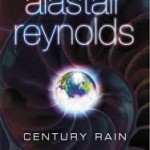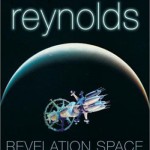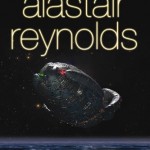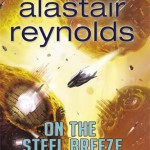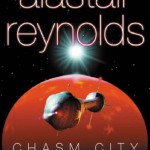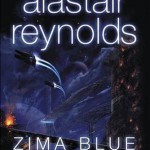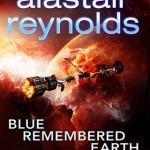Revelation Space was my first published novel. The book had a confused genesis. Somewhere in 1986, I started work on a long short story which I hoped to submit to the “Writers of the Future” competition. Unfortunately, my story ended up longer than the limit for the competition, which I believed was around 17,000 words. Rather than trim the piece, I decided to carry on with it, especially as I was nowhere near the end of the story. Set in a universe with no FTL travel, this ulimately unfinished novel contained the seed of many of the ideas that ended up in RS. At this point I had not sold a word of fiction, although I had won a small cash prize from a region schools magazine for a piece written a year or two earlier. I abandoned work on this version of the book somewhere around 1987-1988.
My second bite at the novel happened when I moved to Scotland. Although I continued to work on a manual typewriter for my short fiction submissions, I now had access to a dedicated Word Processor located in the university observatory. Loaded with Wordstar Plus, this terminal could handle about a chapter’s worth of prose at a time. I saved my chapters on floppy disks, which I still have. This version of Revelation Space (as yet untitled) was closer still to the final entity. Things moved on slightly in 1989 when I made my first professional fiction sale, which opened doors to the world of SF publishing. At a party in London in 1990, I met an editor who agreed to look at some sample chapters of my work in progress. I sent three chapters and a synopsis. I got back a nice rejection letter – basically saying that I was not quite there yet, but that I should keep at it. I ended work on this version of the book at around this time. Another factor was that the university moved its astronomy department to another building, meaning that access to the WP terminal was not as straightforward. By then, too, I had become reasonably proficient in LaTex, which is the standard text formatting language for scientific publication. My next few stories for magazines were written in LaTex.
I picked up work on the novel again in 1992, following a move to the Netherlands. I now had time to myself and the privacy to get on with writing. I decided to make a clean start of it, refusing to refer to any of the earlier versions. Returning to the manual typewriter, I started the first draft of this version of the book in the Autumn. I worked hard at it through 1993, and completed the book early in 1994. In fact I completed the novel a day before leaving for an observing campaign in Australia.
After the book was finished, I did no more than tinker with it for a few years. Eventually, it was OCR’d into digital format and I worked on an Apple Mac SE. At the start of 1997, I had a period of unemployment between work contracts which gave me time to polish the text and prepare some sample chapters and a synopsis. I submitted the novel to Gollancz, then an independent publisher. It’s a long story, but by the time Gollancz made me an offer two years later, they had become absorbed into the larger Orion publishing house. The delay was frustrating, but ultimately a good thing as Orion had experience with long novels, whereas Gollancz would almost certainly have wanted to publish RS in two books. My editor, Jo Fletcher, remains a significant and influential figure in UK genre publishing and I am very grateful for Jo’s enthusiasm and commitment during those early days.
Revelation Space was originally scheduled for 2001, but was eventually brought forward to 2000. 1999, during which I struggled to complete edits on RS and deliver Chasm City, was an extremely tough year. But the book duly appeared, and to my immense relief, the first couple of reviews – from Gary K Wolfe and Jonathan Strahan – were extraordinarily generous. I was also grateful for the kind words from fellow writers Paul McAuley and Stephen Baxter, both of whom helped generate interest in the novel. Gollancz, meanwhile, went to great lengths to find the “right” cover treatment and in the final artwork, hit on a stark, minimalist look which – to our amusement and occasional frustration – would be imitated on many other book covers.
There is an element of luck and timing in any publishing venture, and I was fortunate – very fortunate – that RS did well. It picked up a buzz, then a readership, and the reviews were mostly positive.Within a few months, RS had been shortlisted for both the Arthur C Clarke and BSFA awards, and was soon to be on the Locus shortlist for best debut. It won none of these awards, but it was nice to be on them. The book has been in print ever since, and while I am more than aware of its flaws, I’m also very proud of it.
